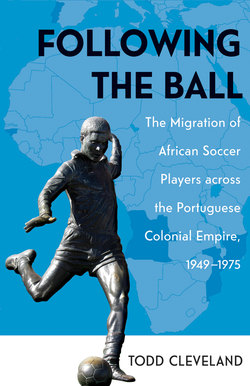Following the Ball

Реклама. ООО «ЛитРес», ИНН: 7719571260.
Оглавление
Todd Cleveland. Following the Ball
Отрывок из книги
Following the Ball
This series of publications on Africa, Latin America, Southeast Asia, and Global and Comparative Studies is designed to present significant research, translation, and opinion to area specialists and to a wide community of persons interested in world affairs. The series is distributed worldwide. For more information, consult the Ohio University Press website, ohioswallow.com.
.....
Although scholars have considered the implications of provenance among immigrant communities elsewhere, examples of interracial cooperation in these reconstituted communities are rare, as diasporic populations often reflect and actively maintain preexisting social divides.20 My emphasis on the experiential importance of provenance and, in particular, its transcendent role in helping to facilitate and deepen intercultural amity among these migrant athletes builds upon work by scholars who have examined the development of genuine interracial, intergender relations in colonial Africa.21 However, this book extends the analytical and geographical scopes of such work by adding intragender examples that featured on the continent, but also persisted into the diaspora. Although scholars have rightfully debunked Lusotropicalism—the notion that the Portuguese were uniquely predisposed to interact with their colonized subjects in a more congenial, less exploitative manner—these players’ engagement in a multitude of cooperative and conciliatory relationships with Portuguese in both the metropole and the empire to enhance their lives suggests that a more complex rendering of race relations in both settings be perpended.22
III. By considering the ways high-profile immigrant athletes occupied liminal spaces and, thereby, bridged gaps in colonial and metropolitan society, this book also engages with the extensive literature regarding African intermediaries. Heretofore, scholars have reserved this category for indigenous clerks, soldiers, and police, and, at times, traditional authorities—in short, those who assisted with the delivery or facilitation of colonial projects.23 The inclusion of African soccer migrants broadens this collection of historical actors. In the colonies, the migrant footballers increasingly operated in an intermediary manner as they ascended to play for predominantly white clubs in the urban centers, while continuing to reside in the largely black suburbs. And, in the metropole, as successful indigenous practitioners of a European game and tangible manifestations of Africa at a time when few individuals from the continent were present in Portugal, they routinely functioned as social and cultural intermediaries. Their ability to navigate, straddle, and increasingly move fluidly between African and European circles helped to erode some of the perceived cultural distinctions between these communities.
.....